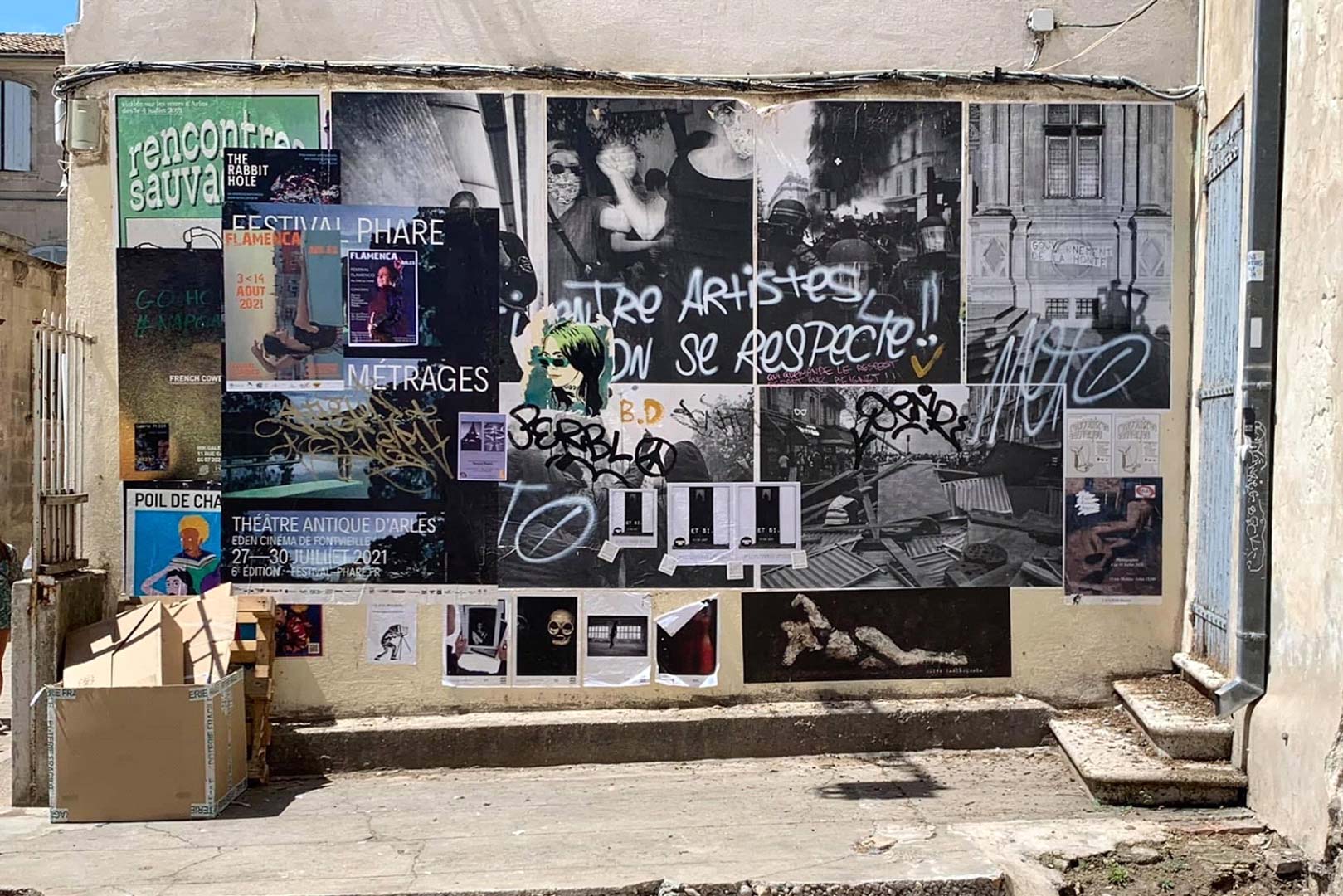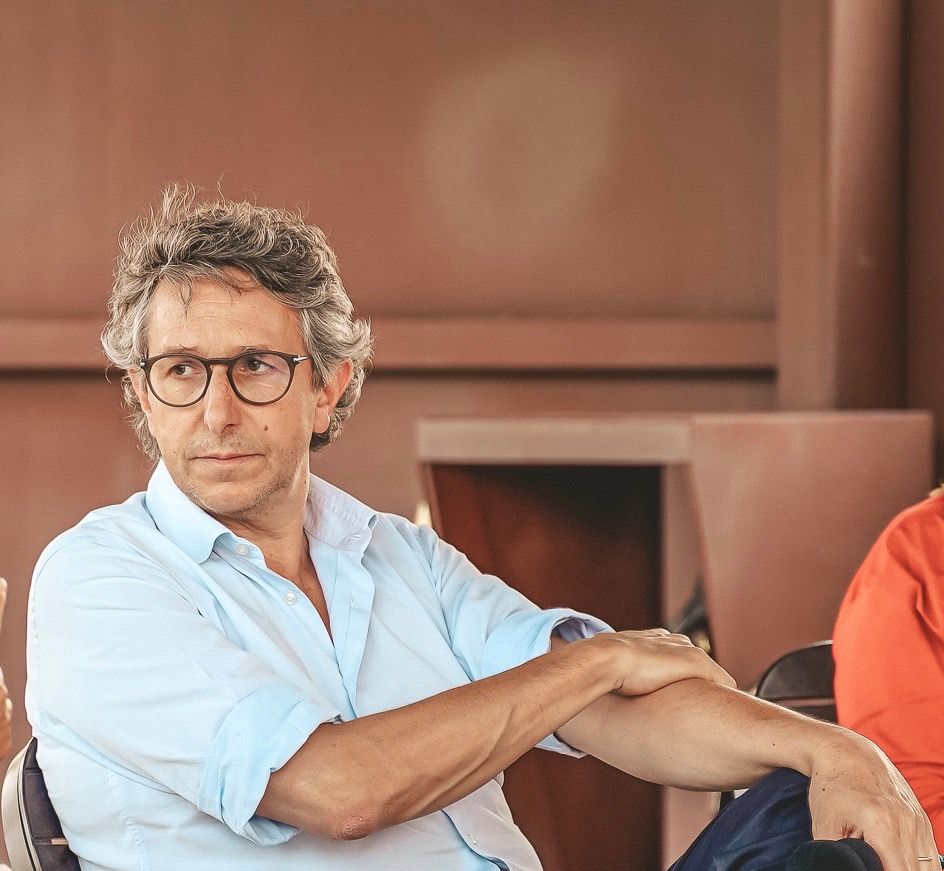IT’S EASIER TO THINK ABOUT THE END OF THE WORLD THAN THE END OF CAPITALISM
By Franco Broccardi

Don’t look up is a well-known and widely seen and appreciated film. And when I say widely, I mean very widely. A metaphor, a film, whose meaning is simple, disturbing, true and not at all concealed: if we don’t do something we will all die
soon. And not quietly, either.
So many people have seen the film you would expect it to have triggered global and deep-seated alarm about the various crises we are going through, starting with the climate crisis and ending with the social one. A serious discussion perhaps too, some urgent measures. But no. Everything has gone quiet. Our leaders get lost in sterile discussions with sterile conclusions and young people get angry. Very angry.

Similarly, during lockdown, Massive Attack released the video EP #//Eutopia1. Each of the three tracks, which I recommend everyone watch, read and listen to, delves into a political issue by creating an audio and visual dialogue on global and structural issues such as the climate emergency, tax havens and universal basic income. One of the videos in particular focuses on crises, the ones we deal with on a daily basis, and how we should confront them. In this piece, Christiana Figueres, former Executive Secretary of the United Nations Framework Convention on Climate Change, says that before the COVID-19 crisis hit the world, governments were addressing the climate crisis, the inequality crisis and the oil price crisis. Now a fourth one - the global health crisis - not only affects us all but has accelerated the impacts of previous crises, intensifying economic disorder and accentuatingsocial suffering. As this emerges further everyone can do their part, individually and collectively.
The environmental crisis becomes economic and ultimately social and affects the weakest in society by fuelling inequalities; rising seas are leading some populations
to seek asylum as climate refugees. Everything is connected, environment, social equality, economy, public health. We are all connected, and not just because of the internet. And a culture that is really Culture cannot think otherwise.
It cannot but think of itself as a political subject with a social impact.
And yet. And yet, even now, when one talks about it one feels resistance, distance, restraint. There is no shortage of horrible creatures that prey on humans, snatch their food or devour entire populations, but examples of wise social planning are not so easy to find. This sentence is the foundation of the #//Eutopia project which indicates, according to its creator Robert Del Naja, the necessary direction towards what is, in fact, wise social planning. The juxtaposition of this with the elitist tendency we often find in social dynamics, where wealth tends to increasingly accrue around a few subjects, conditioning the cultural scene and showing the discrepancy between the people that make up this variegated world, is just one of the cracks in modern capitalism.
The actions of Just Stop Oil protesters, or in Italy, Ultima Generazione1 T. Moro, Utopia, 1516 activists, is about this. They are right to be angry, given the deaf ears issues that involve our survival fall on, in the cultural sphere too. The most precious thing they have, the future, is in danger of ceasing to exist. And they shout it in our faces as best they can because, after all, what do you do with a museum when it is flooded or buried by a landslide? Things like the MOSE flood barrier in Venice and everything else we invent are just temporary fixes, not a solution to the problem.
Every single one of us, no exceptions, must try, personally and in aggregated form, to turn this anger into action. Let’s really try to change things so that those who are born now have some chance of seeing old age.
When Dan Halter takes a speech by writer and activist Kimberly Latrice Jones written for the Black Lives Matter 2 movement (in which she uses a metaphor appropriated from the game of Monopoly) and transforms it into a work of
art3 (also in Monopoly form) he doesn’t debase its meaning but makes it his own and, indeed, enhances its value. So why do we need to think it’s offensive to appropriate a work of art and make it part of a social condemnation, an environmental protest and a general proposition around values? What a low regard for art we have if we think of it as detached from the world and distant from others? It is easy to show support while remaining firmly on one’s own pedestal. Without really taking sides. And this is what art and culture (or rather, the people
who claim to be concerned with art and culture) too often do. To the question Kimberly Latrice Jones asks in her speech therefore, how can we win?, all that remains is to agree with her and say you can’t.
You can’t win when everyone is looking only just beyond the fine words they are uttering. You can’t win because the game is fixed. So when they say “why are you burning down the community? Why are you burning down your own neighbourhood?”, we reply, it isn’t ours. We don’t own anything. And this is even more true and tragic when what you no longer own is your own future. So how do (or should) culture, art and museums face the challenges that impact the lives of each and every one of us, the crises that we face daily and that are revealing themselves to be more serious and profound every day?
Alva Noë is an American philosopher and cognitive scientist for whom perception, being conscious, is first of all moving, acting. As he wrote about John Dewey: he was right when he said that the museum is, in a sense, antithetical to art, precisely because it isn’t possible to experience art simply by looking at it, taking note of what the audio guide or expert says, as if the value of art were easy to convey! Works of art are not displayed in museums for people simply to look at. Audience and creators interact through the opportunities brought about by the artists. We don’t just perceive art, we stage it.
For Dewey a work of art is an experience and as such is perceived from the point of view of the person experiencing it, not the person who creates it. Otherwise it has no value.
We are all artists. We live and life is a process of experiencing, of coming up with creative responses to what we do as a reaction to what is already happening. But art is still something else. In the final instance, art is philosophy because it consists of showing everything about our condition and nature as human beings2. We are all artists, to the extent that, as we have seen in this book and as Dewey writes, the need to make art, the need to make philosophy, the need to know, are all present where we are present, wherever there’s a human being.
Hito Steyerl often expresses the same thing by asking a question the post-Covid age has amplified the need for an answer to: what is a museum’s raison d’être?
History only exists if there is a tomorrow. And, conversely, a future only exists if the past is prevented from continually infiltrating the present... Consequently, museums do not deal with the past but rather with the future: the goal of conservation is not so much to preserve the past as to create the future of public space, the future of art and the future as such1. If this isn’t clear the museum is reduced to the role of a zoo and its works to miserable objects held in captivity.
Animals isolated from one another where there is no interaction between species come to depend completely on their guardians2. In his collection of essays titled Ways of Seeing John Berger reveals the unnaturalness of the behaviour of those forced into inaction, in which the future Steyerl hoped for simply does not exist.
But are we sure the same doesn’t happen with works held captive in museums when the latter no longer manage to enter people’s consciousness? That art and culture reduced to this don’t end up being the instrument of a single, illiberal way of thinking even when cloaked in the mantle of progressivism? That a museum that reduces creativity to display, to the mere showcasing of works, is not that different a cage from those used to lock up animals in order to satisfy some sick curiosity?

In a famous article of Esther Duflo’s titled The Economist as Plumber4, which I must admit I quote very often, she urges economists to engage seriously in the design of new policies and programmes taking responsibility for any consequences
and possible adjustments (just like plumbers do) in the interests of the discipline and society. If it applies to economists why should it not apply to everyone? Why should anyone feel exempt or think they have done enough? The
plumber reference allows us to link the title of this article with another essay, Le role fondamental du plombier dans le porno (The fundamental role of the plumber in porn) to seek new paths. And this is basically what Duflo tells us: innovation comes from the ability to be unprejudiced. It goes from cultural inclusion and functional literacy to the understanding of value and we are all called upon to do our part, to change systems and mindsets. Everyone has a history of contamination behind them.
Purity is not an option. A valuable aspect of reflecting on precariousness is that it reminds us that changing according to circumstances is the very stuff of survival.
Inequality strongly impacts economic, social, intellectual and political prospects and the decisive element for human progress and economic development is therefore the struggle for a new participatory horizon based on equality, social ownership, education and the sharing of knowledge and power.
This is why inequality needs to be talked about in an article about culture. Because innovation, and therefore the possibility that inequality can somehow be predicted, denounced and corrected, passes through culture even before technology.
It is the social role of art and culture without which these have no reason to exist. It is the idea of sustainability that must be at the heart of this; without it, it leads nowhere.
The advent of an innovative idea renders previous ideas obsolete; in other words, growth based on creative destruction is the theatre of perpetual conflict between the old and the new.
This does not mean seeking the destruction of capitalism but focusing on political solutions that are able to address redistributive fiscal policies, economic policies that massively favour green innovation and inclusive social policies.
The lesson of economist Philippe Aghion matches perfectly with the reaction of the International Council of Museums (ICOM) to climate activism in museums: Civil society is a key player in climate action, from NGOs, networks and activists
to cultural institutions and museums. We must redouble our efforts for our planet collectively and in unison because there are no climate solutions without the transformation of our world. Operational transformation and transformation of thought. Innovation, therefore. In spite of many other more anti-intellectual reactions bordering on paternalism, if not denialism, ICOM therefore shares the concerns of climate activists as we face an environmental catastrophe that threatens life on earth. ICOM sees the choice of museums as a backdrop for these climate protests as a testament to their symbolic power and relevance in discussions around the climate emergency... ICOM wants museums to be seen as allies in addressing the common threat of climate change.
Everything comes together and nothing can think of itself as autonomous unless it is devoted to failure. Social, environmental, economic sustainability, cultural commitment, the fight against inequality are parts of a whole even if we
often tend to forget it. And so going back to the title of this article it is perhaps true that it is easier to think about the end of the world than the end of capitalism, but in the end, perhaps it is because we protect capitalism more than anything else by thinking only just beyond our noses. Which is never a great thing no matter how long that nose may be by dint of telling lies.

Franco Broccardi is a chartered accountant, expert in cultural economics, arts management and company management and administration, Franco Broccardi holds the positions of consultant and auditor for Federculture, ICOM, AWI, ADEI, as well as for various museums, theatres, art galleries, foundations and cultural associations. He is Coordinator of the Assobenefit Academy.
